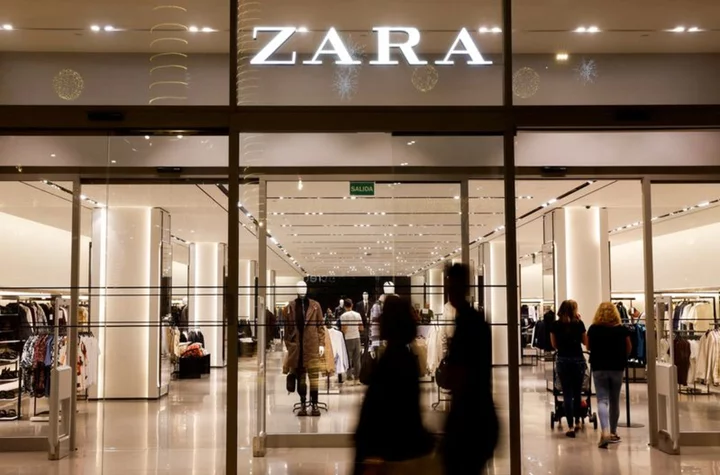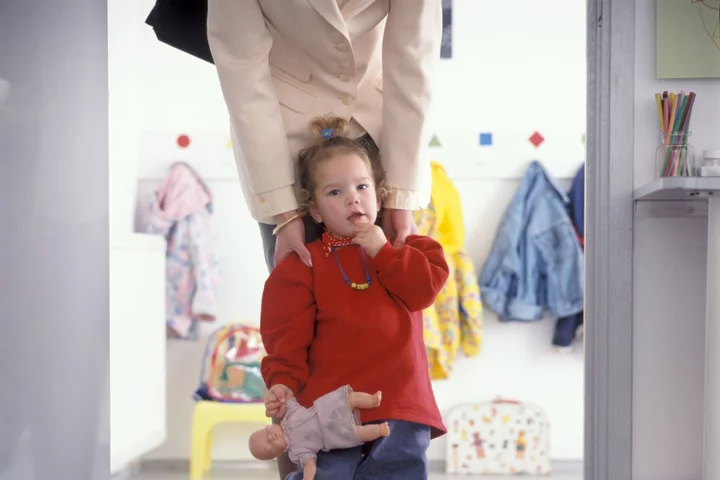
Russia hikes interest rates to 15% as inflation soars
The Bank of Russia raises rates more than expected to try to lower inflation and boost the rouble.
1970-01-01 08:00

Did the refs screw the Bucs with no-call pass interference on TNF Hail Mary attempt?
In the latest Thursday Night Football game, the referees may have missed a pass interference call, a costly mistake for the Buccaneers which prevented an upset.
1970-01-01 08:00

Zara owner Inditex's suppliers to buy 2,000 tons of fibre recycled from cotton waste
MADRID Zara owner Inditex, the world's largest clothing retailer, said on Friday its suppliers would buy 2,000 metric
1970-01-01 08:00

Investors scoop up tech stocks and long-dated Treasuries - BofA
LONDON Investors have poured money into beaten-down, long-dated U.S. Treasuries and bruised tech stocks in recent days, BofA
1970-01-01 08:00

If being without your phone fills you with dread, you could have nomophobia
If you’re filled with terror at the prospect of being without your phone, you’re not alone. A new poll has found that 42% of British adults identify with ‘nomophobia’ – the fear of being stuck without mobile phone connectivity. According to psychologist Dr Linda Papadopoulos, nomophobia is firstly about “dependency”, and secondly about “slight catastrophising”. She said: “The key to having a healthier relationship with your phone is implementing values, boundaries and being self-aware when it comes to how we use our phones.” Of the 2,000 people surveyed by Sky Mobile, 23% said they would rather hold a tarantula, 14% said they would prefer to go swimming with sharks, and 15% said sleeping in a haunted house would be better than being without 5G for an entire week. According to the research, on average British people use their phone for 14 hours per week. Here’s what you need to know about phone addiction – and how it might be impacting our wellbeing… How can we spot the signs of nomophobia or phone addiction? According to Papadopoulos, it’s quite simple. “If you’re engaging and constantly checking to see where your phone is or if you’ve missed a call, [and are] worried, anxious about the possibility of missing out” – whether this is a social event or something work-related – you could have nomophobia, Papadopoulos suggested. “We’re at our most peaceful when we feel like we have control over something.” She encourages you to think about the first thing you look for when you wake up or walk out the door – if it’s your phone, it could be a sign of nomophobia. “There’s also this thing where we think our phone is vibrating, and it’s not. That’s another sign too.” Has social media made it worse? It’s important to understand what our phones are to us. “They’re no longer just phones, right? They are these digital prostheses, which we use to do everything from learn to work to connect,” said Papadopoulos. “In the case of things like social media, we know that a big part of our desire to be on those apps is around that sense of not just belonging – which obviously they were originally intended for – but also that sense of missing out. “So I think anything that you do, which relates to who you are, your expectations around your work, your personal life, are all going to feed into this.” How might it be impacting our wellbeing? “It all depends on what we are doing with our phones. If I’m sitting down doom scrolling, of course it will affect how I’m feeling. That’s not great,” she suggested. “You want to own your technology instead of your technology owning you. Don’t catastrophise your mobile phones, because there are other things you can do to remain connected and it can lead to technology separation anxiety – the disproportionate sense of fear of being without your technology. “When you are talking about any sort of addiction, if it gets in the way of your day-to-day life, you start having disproportionate reactions, struggle to engage with people in real life, your sleeping pattern is non-existent or not eating your dinner, those are the sorts of things you should look out for when it comes to nomophobia. “For example, if a 12-year-old girl is posting a bunch of things on social media and sitting at her phone waiting for likes, that would be a sign of her phone affecting her mental health.” But there are also positives to mobile phones, Papadopoulos adds. “I live really far away from my family. Sometimes I even cook with my mum, even though she lives in Cyprus,” she said. How can we start to address it if we think we have a problem? “Do basic things like keeping your phone in the same place to avoid using brain power constantly looking for where it is,” Papadopoulos advised. “And don’t vilify or deify your mobile phone. It’s neither the best thing in your life or the worst. This will help you start to get a sense of control over those anxious thoughts.” If you’re concerned that your behaviour might be addictive, see your GP for help. For more information on how to switch to Sky Mobile visit https://www.sky.com/shop/mobile. Read More Nursery places and wraparound childcare plans announced Is scalp exfoliation the key to healthier hair? Why do some people love horror movies? TikTok influencers warn about ‘potent’ steroid cream risks among black women – dermatologist explains the risks House of the Year 2023 shortlist revealed by Royal Institute of British Architects Fatima Whitbread supporting new fostering campaign, as research finds ‘misconceptions put people off’
1970-01-01 08:00

Nursery places and wraparound childcare plans announced
Parents can go online to find out what childcare they are eligible for under plans which will see nurseries expanded to provide more places and funding given to councils for wraparound care. Further details of the previously-announced reforms to allow some families of children as young as nine months to claim 30 hours of free childcare a week – set out by Chancellor Jeremy Hunt in the March Budget – have been announced. The Department for Education said parents in England can visit an eligibility checker online to see what they are entitled to, depending on their earnings and their child’s age. The Government said £100 million is being made available for nursery and early years places, with funding intended to support childcare settings to increase their physical space, which the department said is anticipated to add thousands of new places across the country. Following Mr Hunt’s target for all schools to be able to offer care either side of the school day by September 2026, local authorities will also now be getting details of how much of the £289 million wraparound fund they will receive – based on “anticipated need”. Early years leaders had previously expressed concerns that nurseries and childminders could struggle to deliver additional places for younger children from next year if the funding provided by the Government does not meet rising costs. The offer of free childcare for working parents will be available to those with two-year-olds from April 2024, covering around half a million parents, but it will initially be limited to 15 hours. From September 2024, the 15-hour offer will be extended to children from nine months, helping a total of nearly a million parents, and the full 30-hour offer to all under-fives will come in from September 2025. This is the largest investment in childcare in our history, so I encourage people with young children or those thinking about starting a family to visit the Childcare Choices website to find out what they’re eligible for Education Secretary Gillian Keegan Education Secretary Gillian Keegan said: “No-one should have to choose between having a career and having a family, so I’m determined that every parent who wants it should have access to the childcare they need. “Flexibility is at the heart of our plans to transform childcare for families, whether it’s offering quality childcare out of school hours or making sure there are more early years places where they’re needed most. “This is the largest investment in childcare in our history, so I encourage people with young children or those thinking about starting a family to visit the Childcare Choices website to find out what they’re eligible for.” Paul Whiteman, general secretary of school leaders’ union NAHT, said that far more investment is needed. “Unfortunately, the money behind this expansion is a fraction of what is required. Our members are also questioning where they will find the additional staff,” he said. “There is a real danger that the Government’s promises could fall short in reality if they don’t urgently look again at the funding and resources.” Helen Hayes, Labour’s shadow children and early years minister, added: “Without more details about whether this is new money, how many places it will provide and how new childcare will be staffed this pledge isn’t worth the paper it’s written on. “The Conservatives have overseen a dramatic fall in the number of childcare providers and places – they simply cannot be trusted to deliver the change in childcare that families need and deserve.” The department also said the childminder start-up grant scheme will open for applications by the end of November. The grant – £600 for those who register with Ofsted and £1,200 for those who register with a childminder agency – is aimed at boosting the numbers of childminders working to offer parents more flexible childcare. Work and Pensions Secretary Mel Stride said: “Boosting employment is key to growing our economy, and the extra money provided for parents on Universal Credit will give them the flexibility and security they need to find a job, support their children and reap the benefits of work. “I encourage every parent to access this resource to see what help is available and to talk to one of the thousands of Work Coaches in our Jobcentres who are there to help them find work or enhance their skills.” Parents can visit childcarechoices.gov.uk to use the eligibility checker. Read More Is scalp exfoliation the key to healthier hair? Why do some people love horror movies? TikTok influencers warn about ‘potent’ steroid cream risks among black women – dermatologist explains the risks House of the Year 2023 shortlist revealed by Royal Institute of British Architects Fatima Whitbread supporting new fostering campaign, as research finds ‘misconceptions put people off’ 5 key coat trends to complete your autumn/winter wardrobe
1970-01-01 08:00

Is scalp exfoliation the key to healthier hair?
Every beauty buff knows that exfoliation is a key part of any skincare routine. Whether you use a physical scrub or a hydroxy acid solution that penetrates below the surface, sloughing away dead skin cells is essential for maintaining a smooth, glowing complexion. When it comes to hair care, it’s easy to forget the importance of looking after your scalp, but experts warn the consequences of neglecting the skin on your head can be serious. “How healthy your scalp is has a direct effect on how healthy your hair grows,” says says trichologist and Viviscal ambassador Hannah Gaboardi. “Scalp issues such as dandruff and psoriasis are linked to hair breakage. Having poor scalp health can also lead to premature hair loss.” While we talk about washing our hair, lathering up with shampoo is about keeping the scalp clean too. “Our scalps collect dust, dirt, oils and dead skin cells which can all lead to a breeding ground for fungi and bacteria,” says Anabel Kingsley, trichologist and brand president at Philip Kingsley. “Malassezia yeast – the root cause of dandruff – breeds in an oily scalp environment, contrary to popular belief that it’s a dry scalp issue.” How can you tell if your scalp health is suffering? “Some of the first things I tell my clients to look out for if they are having issues with their scalp is if it becomes itchy, starts to burn, hair loss and dandruff,” Gaboardi says. Kingsley says others signs may include: “Irritation, flaking, pustules, odour, scabbing, bleeding and excessive oil.” She continues: “Perhaps it’s because we cannot see our scalp, but it’s very often neglected, and common sense tends to go out of the window when it comes to looking after it.” So what does a sensible scalp care routine look like? The good news is that it’s not complicated, and only requires two steps. The first step is cleansing, which you’re probably already doing if you shampoo your hair regularly. “A clean scalp promotes good cell turnover, leading to super healthy strands,” says Gaboardi. “When your hair and scalp aren’t covered in the build-up – whether it be dead skin cells or product, you are less likely to suffer from dandruff.” Contrary to the recent TikTok trend for ‘hair training’ – leaving your locks unwashed for as long as possible so they produce less oil – frequent shampooing is best, according to our experts. “Daily if your hair is fine, or at least every third day if you have coarse or coiled hair textures,” says Kingsley. “You wouldn’t leave three days between washing your face, and you likely wouldn’t wear the same outfit more than a few times before washing it – apply the same thinking to your hair.” The second step is exfoliation, which can be done in tandem with your shampoo. “I always recommend incorporating a scalp massage into your routine which increases hair thickness and stretches the cells of hair follicles to produce fuller strands,” says Gaboardi. “It’s also thought that direct stimulation and stretching of human dermal papilla cells may help dilate blood vessels beneath the skin encouraging hair growth.” She likes to use a massaging tool with spiky (but soft) plastic bristles once or twice a week: “Put the shampoo on first, then massage it into your scalp. This is a great way at exfoliating the scalp and removing any dead skin cells.” Alternatively, you can apply a specially formulated scalp serum or mask. “Scalp masks containing gentle chemical exfoliants are great for general scalp health, but especially for those who suffer from dandruff and seborrhoeic dermatitis as they help to remove dead skin cells,” says Kingsley. Don’t be too heavy-handed, she warns: “You should not scrub a scalp mask into your skin – gently but firmly massage it in. “Most masks are formulated to be left on for up to an hour, but read the directions on the packaging as this will vary.” There’s one other benefit to giving your scalp a bit of TLC, Gaboardi adds: “Your hair products are able to penetrate your scalp better and easier, leading to more effective results.” Skincare for hair: 8 effective products to cleanse and exfoliate your scalp 1. The Body Shop Ginger Shampoo Bar, £10 2. Ffør Purify: Scalp Cleanse, £22 3. Philip Kingsley Flaky/Itchy Scalp Anti-Dandruff Mask, £20 4. Boots Ingredients Exfoliating Scalp Serum With Salicylic Acid, £2.55 5. Arkive The Root-ine Scalp Scrub, £6, Boots 6. Ful Detox Scalp Treatment, £30 7. Ful Scalp Massager Shampoo Brush, £9.50 8. Body Proud Sami the Duck Scalp & Body Brush, £8.95 Read More Why do some people love horror movies? TikTok influencers warn about ‘potent’ steroid cream risks among black women – dermatologist explains the risks House of the Year 2023 shortlist revealed by Royal Institute of British Architects Fatima Whitbread supporting new fostering campaign, as research finds ‘misconceptions put people off’ 5 key coat trends to complete your autumn/winter wardrobe 12 ways to weave some woodland wonder into your home
1970-01-01 08:00

Your forties is the perfect decade to have your first child – I’m living my best life
Seven years ago, I was at my local antenatal class preparing for the birth of my firstborn. In my forties and armed with a coloured birthing ball, I looked around and gasped. All the other soon-to-be-mums were at least a decade younger than me. Some were nearly half my age. It briefly panicked me. Would I make any friends? Why did I leave it so late to have kids? Was I doing something wrong? In hindsight, though, I had no reason to worry: your forties is absolutely the best decade in which to have your first child. According to data published last week in The Daily Telegraph, the number of women becoming first-time mothers in their forties has increased in recent years: today, one in 25 UK births is to a woman aged 40-plus. That’s a lot of women just like me, despite the fact that getting pregnant over 35 gets you labelled as someone of “advanced maternal age”. That might sound harsh until you remember that older pregnancies used to be termed “geriatric” – thank God that’s been phased out. I’ve never regretted waiting until my forties, even if I had been trying for children for years by that point. My story is undeniably unique: my partner Alex took his own life while we were doing IVF, but that didn’t stop me from continuing to try to get pregnant. The maternal call was strong, so I decided to carry on with the process using Alex’s frozen sperm. Today I have two beautiful daughters with him: Lola, seven, and Liberty, five. It is an understatement to say I was ready for a baby at 40. I was grounded. Confident. Unlike when I was in my twenties or thirties, I knew exactly who I was and what made me tick. I had life experience. I no longer got FOMO. I didn’t even drink, having been through hell and back to become sober 20 years earlier. My career was fully off the ground, and therapy had helped me identify the family dysfunction I knew to ditch for the sake of my kids. I also wasn’t worried about my body bouncing back after the birth. I just desperately wanted to be a mum. Of course, there are all sorts of advantages to having children in your twenties and thirties. A huge bonus is that you’re simply more fertile. According to research, 31 is the magic age to have a baby – you’re still as fertile as in your twenties, but you also have more money. I’m sure motherhood in your fifties is great, too – although using your own eggs is highly unlikely, unless you froze them at some point before you turned 35. It means that some older mums often turn to donor eggs. Thinking back on my twenties and thirties, I don’t know how I would have managed motherhood. I don’t think I was ready to put my own needs on hold. I can’t imagine how hard it would have been to juggle work and my children, especially with the spiralling costs of childcare. I do accept that there are greater risks inherent in waiting to have kids. Both the quantity and quality of eggs dwindle. The rates of failed fertilisation, miscarriage and birth defects rise with age. There’s also the social pressure that comes with not having children early – you’re forced into endless conversations about the “ticking timebomb” of your fertility, and expected to fend off probing inquiries about your biological clock. The British Fertility Society advises women to start trying for a baby by the age of 32 at the latest, for a 90 per cent guarantee of having a child without resorting to IVF. But this advice simply wouldn’t have worked for me – I was determined to find the right person to have children with, and that didn’t happen until I was 35. When mine and Alex’s attempts to naturally conceive failed, and then Alex died, only at that point did I know I had the maturity to go it alone. I do have some regrets – I wish I’d frozen my eggs at the peak of my fertility in my mid-twenties, for instance (this process costs between £4,000 and £7,000 in the UK). But otherwise, having children in my forties was the right thing to do. Yes, I had my wobbles. I remember sobbing on the bathroom floor after yet another failed pregnancy test. I would berate myself for leaving it so late. I had to force myself to remember that many women experience fertility struggles in their twenties and thirties, too. All of those anxious feelings, though, flew out the window once I had my first child. When I left the hospital to begin parenthood alone, a new bag of nappies in hand, I didn’t have a meltdown. I was just so grateful that I’d had a baby, especially when the odds seemed so stacked against me. Sleepless nights trying to coax my child back to sleep were what I had most desired. It was all so good, in fact, that I went on to have a second child in my forties. I had a spare embryo in a freezer in St Petersburg. Now I call her Liberty. Every day since becoming a mum, I have embraced the mess and chaos, and appreciate every minute. I’m sure my younger self would cringe at the thought of me spending my evenings helping my children with their homework. But I’m proud to say that I’m living my best life. Read More Vanessa Hudgens addresses pregnancy speculation amid Cole Tucker engagement Rachel Bilson reveals she’s suffered multiple miscarriages Pregnant woman has maternity photo shoot in hospital before giving birth Hailey Bieber responds to ‘disheartening’ pregnancy rumours Like Rebecca Adlington, I also lost my baby at 20 weeks Britney Spears reveals she had an abortion while dating Justin Timberlake
1970-01-01 08:00

Josh Allen Had Some Athlete-Themed Audibles Thursday Night
Josh Allen and the Buffalo Bills were on their way to a fairly easy win over the Tampa Bay Buccaneers Thursday night, so people focused heavily on the quarterba
1970-01-01 08:00

Everyone Was Confused By Tampa Bay Trying to Draw Buffalo Offside With Their Field Goal Team
VIDEO: Bucs fake going for field goal before putting.
1970-01-01 08:00

Al Michaels Had No Idea This Buccaneers Field Goal Attempt Was Blocked
No one bothered to tell Al Michaels the Bills had blocked a Buccaneers field goal attempt.
1970-01-01 08:00

How does China fix the Evergrande mess?
The heavily indebted company has become the poster child of the country's flailing property sector.
1970-01-01 08:00
